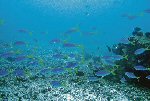Scientist Promotes Marine Reserves to Protect Panama's Sea Life

The Smithsonian Tropical Research Institute (STRI) hosted a symposium entitled “Panama and the Future of Its Oceans” at its Tupper Institute in Panama City last week. They talked about protecting ocean ecosystems, especially Panama's. The Pacific Coast of Panama is known as the "tuna coast" for its abundance of fish but over-fishing and contamination of the ocean as well as destruction of coastal ecosystems from logging, sand mining, and construction have reduced numbers and varieties of plant and animal life in the oceans, including those off Panama’s coasts.
The problem is world wide. According to the United Nations Food and Agriculture Organization the ten primary species of commercial fish species have been exploited to their limits or, in fact, over fished. As such the world will not be able to satisfy an increasing need for food from the sea unless changes are made.
However, a suggestion brought forward by an STRI scientist, Héctor Guzmán, is to follow examples from Cuba, Belize, and elsewhere by creating protected marine reserves where fishing and coastal changes are prohibited. In these areas ecosystems are able to regenerate. The experience in marine reserves elsewhere, according to Guzmán, is that fish grow to larger sizes and reproduce in sufficient numbers to repopulate the protected areas and adjacent, unprotected areas, as well. Fishermen in areas adjacent to marine reserves report catching more and larger fish. Invertebrates in protected marine reserves also seed their eggs for kilometers outside of marine reserves adding to restoration of adjacent areas.
Mr. Guzman used Belize's Grover’s Reef as an example. This is a 74 square kilometer marine reserve where the number of lobsters tripled in three years and grew to larger sizes once the area was protected. In Cuba in the Gardens of the Queen (Jardines de la Reina) Archipeligo marine reserve the biomass of fish tripled compared to adjacent areas open to fishing. According to the STRI scientist in both temperate and tropical marine reserves fish grow big enough and get mature enough to produce enough offspring to restore coastal fisheries and help repair altered ecosystems.
